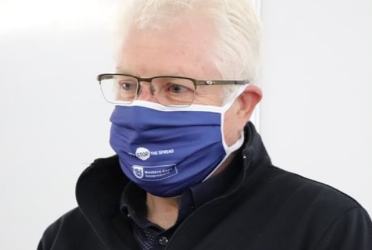South Africans breathed a sign of relief when President Cyril Ramaphosa announced the country will be shifting down to level 3 during a briefing on Sunday [May 24]. Cape Town has been labelled a hotspot due to the high numbers of infections.
Western Cape Premier Alan Winde has welcomed the news of level 3. His office has been hard at work putting together a targeted hotspot plan to help combat the COVID-19 pandemic.
“This targeted hotspot plan will utilise our combined government resources to slow the spread of the virus, to protect vulnerable people, and to save lives. We look forward to working with all levels of government in implementing this plan,” he said in a statement. “We are facing a very serious situation in the Western Cape and the rest of South Africa. The lockdown did not stop the virus, it only bought us time. It will continue to spread, and more and more people will be infected over the coming weeks.”
According to Winde, the situation will only worsen before it gets better, and the hard work begins now.
“That is why it will not be business as usual in the Western Cape. We must all change our behaviour to keep safe and to save lives,” the Premier said. “Every single one of us has a role to play in doing this. When you keep yourself safe – by wearing a cloth mask when in public, by keeping your distance, by following the golden rules of hygiene and by staying home as much as possible – you keep your loved ones safe too.”
He advised Cape residents to change the way they live to always keep the protection of older persons or individuals with underlying health conditions in mind.
These are the details of the targeted hotspot plan:
Health response
- Screen a defined population in a clearly demarcated area in specific hotspot areas for Covid-19
- Test those who screen positive, selectively, based on limited testing capacity, focusing on protecting the vulnerable
- Contact trace those who have been in contact with positive cases
- Quarantine/isolate positive cases either at home or in group isolation facilities, where home circumstances do not allow for it
- Introduce effective surveillance systems in places of gathering, such as workplaces, schools, old age homes and transport hubs
- Work with DSD to reintegrate recovered individuals into their communities
- Educate communities about social distancing, hand washing, cough etiquette and wearing of masks
How are hotspot areas identified?
All 8 sub-districts in the City of Cape Town and 1 sub-district in Cape Winelands (Witzenberg), have established community transmission and have recorded increasing positive cases over the past 4 weeks.
- The initial growth in cases has been linked with specific workplace clusters, from the 3rd week of April 2020. These clusters have seeded more than 790 positive cases to date
- The geographic distribution of the positive cases is clustered in specific localised geographic hotspot areas across the 8 sub-districts
- The hotspot areas with highest density of cases are being targeted to limit the ongoing spread of the virus
Economic response
- Contact and engagement with the business sector is already taking place as per the framework for preventing and managing Covid-19 in the workplace
- Guidelines for the prevention of the spread of the virus in the workplace have been completed and published
- Commitment from businesses to implement guidelines and to have specific workplace guidelines and processes in place
- Businesses are concerned about community transmission occurring outside the workplace and some have implemented screening, temperature measurement before entry to workplace
- Engagement with and support from Department of Health, Department of Labour, City Environmental Health and DEDAT to establish a referral system for inspection and potential closure of businesses have been agreed upon.
- The economic hotspots are largely Retail Stores, Factories and Shopping Malls
- There is a need to have social distancing markings both within the shopping mall precincts as well as the streets leading to the entrances of those malls, especially when SASSA payments are being made
- Provincial government has developed specific guidelines for spaza shops and informal businesses
- It also has significant support and engagement with retailers and shopping mall owners to ensure that the guidelines are implemented
Safety response:
- Alignment of limited safety resources with the hotspot areas via sharing of detailed maps
- Working with SAPS and SANDF and integrated planning on daily deployments
- Identify areas in which people congregate and put measures in place to improve on compliance and social distancing.
- Mobilise additional safety resources to assist with this process, including Neighbourhood Watches.
- Improved protection of law enforcement members against infections.
The rest of the plans for the response can be viewed here.
Picture: Twitter

